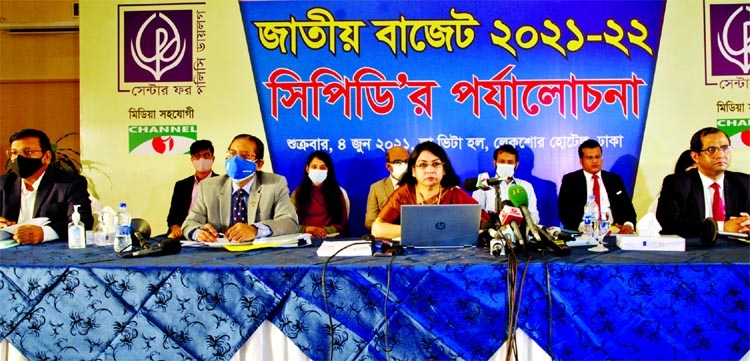
News Desk :
Centre for Policy Dialogue (CPD) on Friday said the national budget proposed for the fiscal year 2021-22 lacks a clear outline to protect the lives and livelihoods and tackle the challenges caused by the coronavirus pandemic.
“It has been told in the budget to move ahead by protecting the lives and livelihoods, but there’s no clear outline how it’ll happen through necessary reforms and enhancing institutional capacity,” said CPD Executive Director Fahmida Khatun.
Speaking at a press conference, she said, “Unlike last year, there has been clarity of thoughts about Covid management in the budget documents, but it has no similarity with the measures and allocations to tackle the challenges.”
CPD, a non-governmental research organisation, arranged the programme at a city hotel to share its observations on the Tk 6,03,680 crore national budget presented by
Finance Minister AHM Mustafa Kamal in Parliament on Thursday, reports UNB.
Fahmida said they hoped that the health sector would get much allocation this time, but it did not happen. “The allocation for the sector is 0.95 percent of the GDP like last year. The total allocation has been increased to some extent, but there’s no increase in absolute terms.”
Stating that the Health Ministry’s performance is the poorest in implementing the ADP, she said there will be no benefit if the allocation for the sector is enhanced without improving the institutional competence of the sector through reforms.
Fahmida also said good governance and accountability must be ensured in the health sector by removing corruption and irregularities for improving its services and proper implementation of the budgetary allocation. “We didn’t see any steps over the last one and a half years to strengthen the sector and establish good governance.”
She said the allocation for the social security sector is not sufficient though several thousand crores of taka have been increased. It remains at 3 percent of the GDP like the previous year. “But the amount is negligible compared to the number of poor people in the country.”
Besides, she said, a quarter of the total social security has been allocated for the pension of government employees.
“Social security allocation should have been expanded a lot, increasing the number of beneficiaries amid the Covid crisis. So, there’s a scope for reform here. A transparent and inclusive list of beneficiaries of the sector needs to be prepared incorporating the urban and rural poor and needy ones,” Fahmida added.
She said the overall budgetary allocation for the agricultural sector has been decreased, but some steps have been taken and different facilities have been given for its development.
Amid the Covid reality, she said the budget should have given the necessary focus on job creation since many people have lost their jobs. “We had an expectation that the issue of job creation would be given importance in the budget, but the allocation for the ministries involved in creating jobs including, Industries, Labour, Youth and Sports and others, have been decreased in some cases.”
Besides, the CPD ED said, a large number of youths are waiting to enter the labour market, but there is less job opportunity for them there. “Many of them want to be entrepreneurs. But the allocation for them has been reduced in the Youth and Sports Ministry. If we can’t involve a huge number of people with the production-oriented activities, it’ll have a negative impact on national development.”
She said the government should have given more focus on the education sector in terms of allocation as academic activities have long been hampered due to the pandemic. “But we’ve seen a negligible rise in allocation for the sector.”

